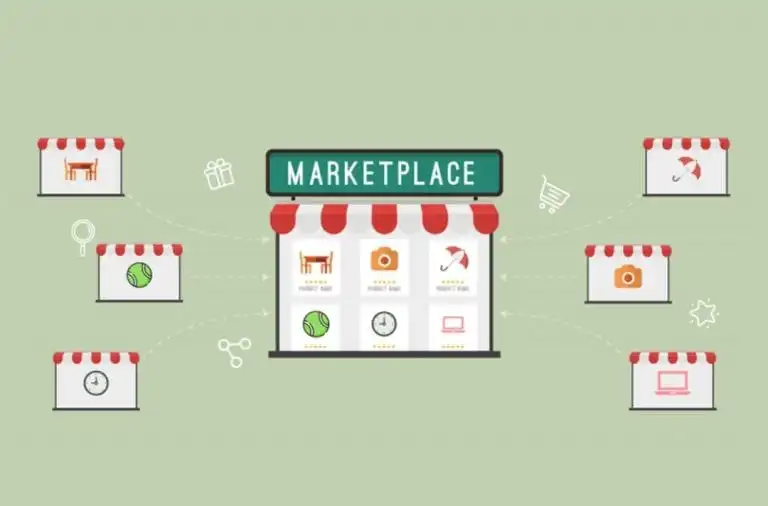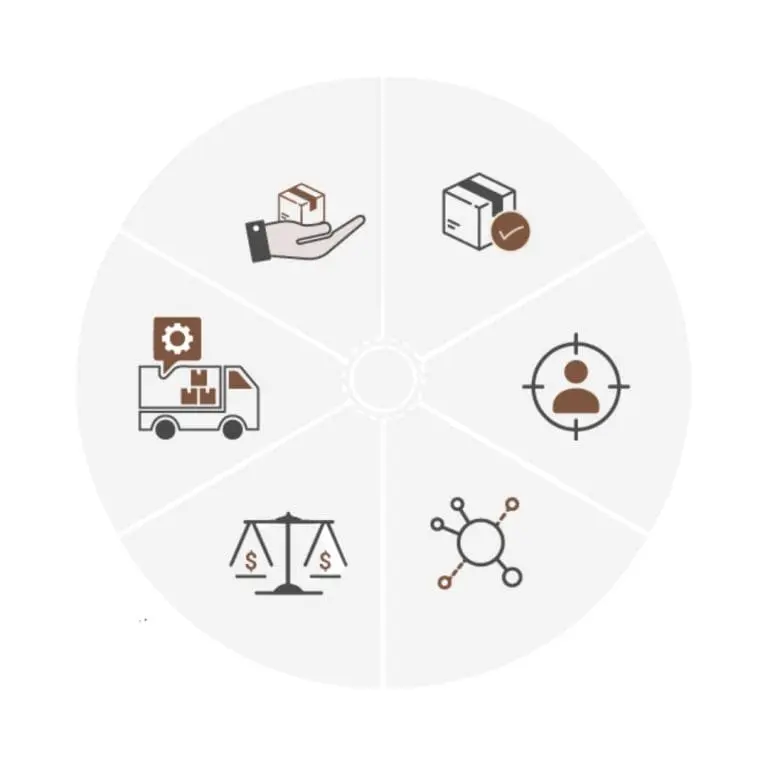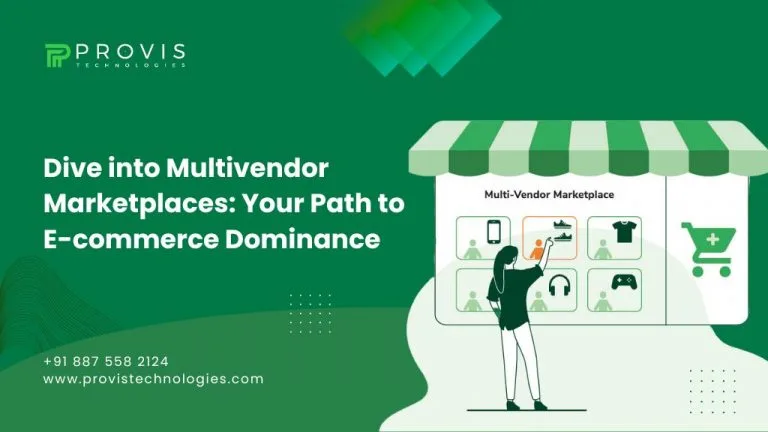Today, e-commerce provides businesses unique growth opportunities. Within online retail, multi vendor marketplaces stand out as powerful platforms. Because they bring together multiple sellers & buyers under one virtual roof. This article explores the concept of multi vendor marketplaces and the benefits they offer to both merchants & consumers. And, if you are looking for a personal e-commerce store, connect with top e-commerce development agencies like Provis Technologies.
What is Multi vendor Marketplaces?

Multi vendor marketplaces are online platforms where multiple third-party vendors or sellers can list and sell their products to consumers. Unlike traditional e-commerce websites owned by a single entity, multi vendor marketplaces provide thousands of products from various sellers to offer customers varied choices. Examples of popular multi vendor marketplaces include Amazon, eBay, Etsy, and Alibaba.
Advantages of Multivendor Marketplaces
Increased Product Variety
Multi vendor marketplaces offer customers a vast selection of products from different sellers across various categories. From electronics & fashion to home decor & handmade crafts – these platforms provide unparalleled product diversity, catering to diverse consumer preferences.
Read More: Mastering E-commerce Expert Tips for Seamless Development
Enhanced Competitive Pricing
Multiple sellers’ presence in a multivendor marketplace enables healthy competition – resulting in competitive pricing. Customers can compare prices from different vendors and choose the best deal, which drives down prices & increases reasonability.
Improved Visibility & Reach
For sellers, multi vendor marketplaces provide access to a large pool of potential customers, allowing them to reach a broader audience than they could ever get. By leveraging the marketplace’s existing user base and marketing efforts, sellers can enhance their visibility and expand their consumer base.
Must Read: Why is 2024 a Great Year to Start Your E-commerce?
Reduced Operational Overhead
Setting up and maintaining an independent e-commerce website can be costly and time-consuming for individual sellers. Multi vendor marketplaces offer a cost-effective alternative, as sellers can list their products on an established platform without extensive infrastructure.
Streamlined Payment & Logistics
Multi vendor marketplaces typically handle payment processing and logistics on behalf of sellers, simplifying the selling process. By utilizing the marketplace’s payment gateway and shipping services, sellers can focus on fulfilling orders and providing excellent customer service.
Read More: A Step-by-Step Guide to Website Optimization Strategies for 2024
Built-in Trust & Credibility
Established multi vendor marketplaces often have built-in trust and credibility among consumers due to their reputation and stringent quality standards. Sellers can leverage the marketplace’s brand reputation to instill confidence in potential buyers and increase sales.
Tips for Success on Multivendor Marketplaces

Optimize Product Listings
Ensure your product listings are accurate, detailed, and visually appealing to attract potential buyers. Use quality images, clear descriptions, and relevant keywords to enhance visibility & conversion rates.
Read More: Color Palette Generators for Website
Offer Competitive Pricing
Stay competitive by pricing your products reasonably compared to other sellers on the marketplace. Consider product quality, shipping costs, and customer service when determining the prices.
Provide Excellent Customer Service
Prioritize customer satisfaction by offering prompt responses to inquiries, efficient order fulfillment, and hassle-free returns or exchanges. Positive reviews and ratings from satisfied customers can boost your reputation and attract more of them.
Read More: Why is 2024 a Great Year to Start Your E-commerce?
Leverage Marketing Tools
Take advantage of the marketing tools & promotional features offered by the marketplace to increase your product’s visibility. Participate in promotional campaigns, utilize sponsored listings, and explore targeted advertising options to reach your target audience.
Build Your Brand Identity
Establish a strong brand identity and differentiate yourself from competitors by offering unique products, exceptional quality, and personalized customer experiences. Invest in branding to cultivate brand loyalty and stand out in the crowded marketplace.
Must Read: The Future of E-commerce: Embracing SaaS Solutions
Monitor Performance Metrics
Regularly monitor key performance metrics such as sales trends, conversion rates, and customer feedback to assess your performance in the marketplace. Use data-driven insights to identify areas for improvement and optimize your selling strategy accordingly.
Bottom Line
By embracing the potential of marketplaces, you can unlock new growth opportunities, expand your customer base, and achieve e-commerce dominance in today’s competitive space. Harness the power of multi vendor marketplaces and propel your business to new heights of success.
FAQs
A multivendor marketplace is an online platform where multiple sellers can list and sell their products or services to consumers. Amazon is an example.
In a multivendor marketplace, sellers create accounts and list their products on the platform. Customers browse the marketplace, select products from various sellers, and make purchases through the marketplace’s checkout system.
While some multi vendor marketplaces may charge a subscription fee or commission on sales, many offer free registration for sellers. However, fees or commissions may apply to transactions or premium features generally.
To become a seller on a multivendor marketplace, you typically need to sign up for a seller account and provide information about your business and products. Once approved, you can start listing your products and selling them to customers. If you need an individual e-commerce store, connect with e-commerce development agencies like Provis Technologies.
Multi vendor marketplaces accommodate millions of products, including electronics, clothing, home goods, handmade crafts, digital downloads, and more.
To optimize your sales on a multivendor marketplace, focus on creating detailed product listings, offering competitive pricing, providing excellent customer service, leveraging marketing tools, building your brand identity, and monitoring performance metrics regularly.
Written By
Author's Picks
- The Role of Mobile App Development in Boosting E-commerce Sales
- 10/11/2024
- B2B vs B2C Ecommerce: What’s the Difference?
- 15/11/2024
- Ecommerce Automation in 2025: Benefits, Strategies & Examples
- 24/04/2025
Categories
- AI for Startups
- AI in Web Development
- AI Integration
- AI Platforms
- AI Prompt
- AI Tools
- AI Trading Software
- Android App
- Android vs iOS Development
- Angular
- API
- API Development
- App
- app development
- App Idea
- App User Feedback
- Application
- Artificial Intelligence
- Audit Services
- Automotive Industry
- Awards and Recognition
- Business Consulting
- Business Website
- Chatbots
- CRM
- CRM for Financial Advisors
- Custom CRM
- Custom SaaS
- Custom Website
- Customer Service
- dashboard design
- Developing a Mobile App
- Digital Business
- E-commerce
- EMR Integration
- Finance
- Financial Advisors
- Financial Advisors
- GIT
- Health Insurance
- iOS App
- iOS App Development
- IoT Mobile App Development
- IoT Platforms
- IT Audit Services
- IT Consulting
- IT Strategies
- Java Development
- Laravel
- Lean Canvas
- Learning Management System
- Logistics Apps
- Mobile App Development
- MVP
- Native App
- News Aggregator Site
- OTT
- Outsourcing IT
- Payment Gateway
- predictive analysis
- Product Launch Strategy
- Progressive Web App (PWA)
- Prototype
- Recommender Systems
- Ruby
- SaaS
- SaaS Application
- SaaS Business
- SaaS Company
- SaaS Development
- SaaS Product
- SaaS Project
- Sales Funnel
- SEO
- Shopping Cart
- Software Development
- SSL and TLS
- Startup Checklist
- Technology
- Tetradic Color Scheme
- UI/UX Design Company
- Unit Testing
- User Flow
- User Testing
- Web Development
- Web Performance Optimization
- website Maintenance Services
- Website Migration Service
- Website Speed Optimization
- WooCommerce
- WordPress





